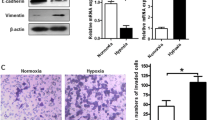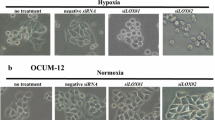Abstract
Background
Procollagen-lysine, 2-oxoglutarate 5-dioxygenase 2 (PLOD2) was induced in hypoxia and participated in cancer development. However, the role of PLOD2 in endometrial carcinoma remains unclear.
Objective
To explore the influences and regulation mechanism of PLOD2 in endometrial carcinoma under hypoxic condition.
Methods
The small interfering RNA (siRNA) targeting to PLOD2 and pcDNA3.1-PLPD2 were transfected to endometrial carcinoma cells to alter PLOD2 expression. Cell proliferation ability was determined by colony formation assay. Wound healing assay used to detect cell migration ability. Transwell invasion assay was used to detect cell invasion ability.
Results
PLOD2 and Hypoxia-inducible factor-1α (HIF-1α) were induced by hypoxia. Down-regulation of PLOD2 did not affect endometrial carcinoma cell proliferation ability, while inhibited cell migration, invasion under hypoxic condition. Besides, down-regulation of PLOD2 increased the levels of γ-catenin and E-cadherin and decreased levels of Fibronectin and Snail under hypoxic condition. Down-regulation of PLOD2 also inactivated Src and phosphoinositide 3-kinase (PI3K)/ protein kinase B (Akt) signaling under hypoxic condition. The promoting effects of PLOD2 overexpression on migration, invasion and epithelial-mesenchymal transition (EMT) of endometrial carcinoma cells were reversed by Akt inhibitor (MK2206) under hypoxic condition.
Conclusion
PLOD2 expression was increased in endometrial carcinoma cells under hypoxic condition. PLOD2 modulated migration, invasion, and EMT of endometrial carcinoma cells via PI3K/Akt signaling. PLOD2 may be a potential therapeutic target for endometrial carcinoma.




Similar content being viewed by others

Availability of data and materials
All data generated or analyzed during this study are included in this published article.
References
Birchmeier C, Birchmeier W, Brand-Saberi B (1996) Epithelial-mesenchymal transitions in cancer progression. Acta Anat 156:217–226
Chen S, Wang LL, Sun KX, Liu Y, Guan X, Zong ZH, Zhao Y (2018) LncRNA TDRG1 enhances tumorigenicity in endometrial carcinoma by binding and targeting VEGF-A protein. Biochim Biophys Acta Mol Basis Dis 1864:3013–3021
Digiacomo G, Fumarola C, Cretella D, Alfieri R, La Monica S, Petronini PG, Bonelli M, Cavazzoni A (2018) Overcoming palbociclib resistance by combined treatment with PI3K/AKT/mTOR inhibitors in mesothelioma cells. J Mol Clin Med 1:151–156
Du H, Chen Y, Hou X, Huang Y, Wei X, Yu X, Feng S, Wu Y, Zhan M, Shi X et al (2017) PLOD2 regulated by transcription factor FOXA1 promotes metastasis in NSCLC. Cell Death Dis 8:e3143
Fischer KR, Anna D, Sharrell L, Jianting S, Fuhai L, Wong STC, Hyejin C, Tina ER, Seongho R, Juliane T (2015) Epithelial-to-mesenchymal transition is not required for lung metastasis but contributes to chemoresistance. Nature 527:472
Gilkes DM, Bajpai S, Wong CC, Chaturvedi P, Hubbi ME, Wirtz D, Semenza GL (2013) Procollagen lysyl hydroxylase 2 is essential for hypoxia-induced breast cancer metastasis. Mol Cancer Res 11:456–466
He J, Wei X, Li S, Quan X, Li R, Du H, Yuan S, Sun L (2019) DT-13 suppresses breast cancer metastasis by modulating PLOD2 in the adipocytes microenvironment. Phytomedicine 59:152778
Humber C, Tierney J, Symonds P, Collingwood M, Kirwan J, Williams C, Green J (2005) Chemotherapy for advanced, recurrent or metastatic endometrial carcinoma. Cochrane Database Syst Rev 5:Cd003915
Ji RC (2014) Hypoxia and lymphangiogenesis in tumor microenvironment and metastasis. Cancer Lett 346:6–16
Kivirikko KI, Pihlajaniemi T (1998) Collagen hydroxylases and the protein disulfide isomerase subunit of prolyl 4-hydroxylases. Adv Enzymol Relat Areas Mol Biol 72:325–398
Kiyozumi Y, Iwatsuki M, Kurashige J, Ogata Y, Yamashita K, Koga Y, Toihata T, Hiyoshi Y, Ishimoto T, Baba Y et al (2018) PLOD2 as a potential regulator of peritoneal dissemination in gastric cancer. Int J Cancer 143:1202–1211
Lluis JM, Buricchi F, Chiarugi P, Morales A, Fernandez-Checa JC (2007) Dual role of mitochondrial reactive oxygen species in hypoxia signaling: activation of nuclear factor-{{kappa}}B via c-SRC and oxidant-dependent cell death. Cancer Res 67:7368–7377
Marshall AD, van Geldermalsen M, Otte NJ, Lum T, Vellozzi M, Thoeng A, Pang A, Nagarajah R, Zhang B, Wang Q et al (2017) ASCT2 regulates glutamine uptake and cell growth in endometrial carcinoma. Oncogenesis 6:e367
May JS, Cheung F, Zgheib NB (2018) Lytic bone lesion in endometrial carcinoma a case report. J Reprod Med 63:175–178
Miller KD, Siegel RL, Lin CC, Mariotto AB, Kramer JL, Rowland JH, Stein KD, Alteri R, Jemal A (2016) Cancer treatment and survivorship statistics, 2016. CA Cancer J Clin 66:271–289
Morice P, Leary A, Creutzberg C, Abu-Rustum N, Darai E (2016) Endometrial cancer. Lancet 387:1094–1108
Noda T, Yamamoto H, Takemasa I, Yamada D, Uemura M, Wada H, Kobayashi S, Marubashi S, Eguchi H, Tanemura M (2012) PLOD 2 induced under hypoxia is a novel prognostic factor for hepatocellular carcinoma after curative resection. Liver Int 32:110–118
Okumura Y, Noda T, Eguchi H, Sakamoto T, Iwagami Y, Yamada D, Asaoka T, Wada H, Kawamoto K, Gotoh K et al (2018) Hypoxia-induced PLOD2 is a key regulator in epithelial-mesenchymal transition and chemoresistance in biliary tract cancer. Ann Surg Oncol 25:3728–3737
Piulats JM, Guerra E, Gil-Martin M, Roman-Canal B, Gatius S, Sanz-Pamplona R, Velasco A, Vidal A, Matias-Guiu X (2017) Molecular approaches for classifying endometrial carcinoma. Gynecol Oncol 145:200–207
Siegel RL, Miller KD, Jemal A (2017) Cancer statistics, 2017. CA Cancer J Clin 67:7–30
Song Y, Zheng S, Wang J, Long H, Fang L, Wang G, Li Z, Que T, Liu Y, Li Y (2017) Hypoxia-induced PLOD2 promotes proliferation, migration and invasion via PI3K/Akt signaling in glioma. Oncotarget 8:41947
Tateishi K, Nakamura T, Juratli TA, Williams EA, Matsushita Y, Miyake S, Nishi M, Miller JJ, Tummala SS, Fink AL (2019) PI3K/AKT/mTOR pathway alterations promote malignant progression and xenograft formation in oligodendroglial tumors. Clin Cancer Res 25:4375–4387
Wang H, Yu Z, Huo S, Chen Z, Ou Z, Mai J, Ding S, Zhang J (2018) Overexpression of ELF3 facilitates cell growth and metastasis through PI3K/Akt and ERK signaling pathways in non-small cell lung cancer. Int J Biochem Cell Biol 94:98–106
Xu F, Zhang J, Hu G, Liu L, Liang W (2017a) Hypoxia and TGF-beta1 induced PLOD2 expression improve the migration and invasion of cervical cancer cells by promoting epithelial-to-mesenchymal transition (EMT) and focal adhesion formation. Cancer Cell Int 17:54
Xu Y, Zhang L, Wei Y, Zhang X, Xu R, Han M, Huang B, Chen A, Li W, Zhang Q (2017b) Procollagen-lysine 2-oxoglutarate 5-dioxygenase 2 promotes hypoxia-induced glioma migration and invasion. Oncotarget 8:23401
Funding
This work was supported by the National Natural Science Foundation (Grant nos. 81860462, 81460227).
Author information
Authors and Affiliations
Contributions
JHW, JLQ and CHT conceived and designed the experiments,QYC and PH analyzed and interpreted the results of the experiments, CMZ performed the experiments.
Corresponding author
Ethics declarations
Conflict of interest
Junhui Wan, Junli Qin, Qinyue Cao, Ping Hu, Chunmei Zhong, and Chunhua Tu declare that they have no conflict of interest.
Ethics approval
The animal use protocol listed below has been reviewed and approved by the Animal Ethical and Welfare Committee.
Patient consent for publication
Not Applicable.
Additional information
Publisher's Note
Springer Nature remains neutral with regard to jurisdictional claims in published maps and institutional affiliations.
Rights and permissions
About this article
Cite this article
Wan, J., Qin, J., Cao, Q. et al. Hypoxia-induced PLOD2 regulates invasion and epithelial-mesenchymal transition in endometrial carcinoma cells. Genes Genom 42, 317–324 (2020). https://doi.org/10.1007/s13258-019-00901-y
Received:
Accepted:
Published:
Issue Date:
DOI: https://doi.org/10.1007/s13258-019-00901-y



